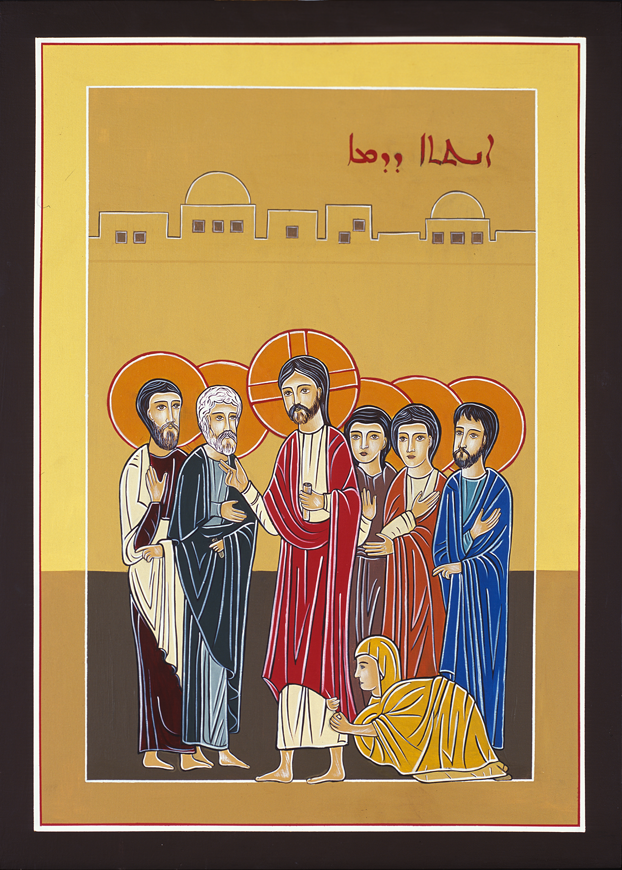
Author: Salwa Elias
In a world of diversity and secularism, it’s easy to lose focus on what is most important in life.
When we are troubled and struggling every day to find some peace or joy in our living, could it be that perhaps we are looking for the wrong things in the wrong places, trying to find that joy?
In the Maronite Lectionary, on the second Sunday during Lent we read about the haemorrhaging woman (Lk 8:40-56) whose joy and peace was only found in the faith which she placed in Christ Jesus.
Can we say the same of ourselves today?
In the Gospels of Matthew, Mark and Luke, this account is interwoven with the account of raising the daughter of Jairus from the dead.
Jairus, described as “a ruler of the synagogue,” approached the Lord, then kneeling at the Lord’s feet, asks him to cure his 12-year-old daughter who is dying—unbeknown to him that she was already dead.
An interesting point of comparison between the haemorrhaging woman and Jairus’ daughter is that one had been sick for 12 years, and the other was born 12 years ago.
The Lord raised a short life which had ended in death, just as he had raised the bleeding woman.
In place of the woman’s faith, the father’s faith sufficed for the girl, when Jesus says to Jairus: “Only have faith and she will be saved.”
For those who argue that infant baptism is impossible because an infant cannot have faith, this shows that Our Lord himself counted the faith of the parents as that of the child.
To the trembling woman who came up to the Lord, admitting that it was she who had touched him, and was immediately healed, the Lord’s response to her was a message for all: “Daughter, your faith has saved you. Go in peace!”
There is some essential background to this event: the religious garment of the priests can sanctify people.
Therefore, the fact that contact with the Lord’s robes could heal the woman shows that he was a priest, and everything he wore was holy.
But there is something more at work here, for as Our Lord says, her faith has brought her salvation.
So, one part of this account is teaching us that the work of the Old Testament priesthood has been perfected by the priesthood of Christ.
The incident of the haemorrhaging woman’s healing reminds me of personal healings in my own family, received many years ago through the intercession of St Charbel, renowned globally for his recorded miracles.
Jesus constantly reminds us that faith is the catalyst for miracles, even if our faith is only the size of a mustard seed.
Yet, not all prayers for miracles are answered according to our wishes, despite having faith.
This is not because God isn’t listening, or rejecting our request, but rather, we must remember that God’s ways are far better than our plans.
He will never abandon us in our needs, but sometimes he will allow us to continue carrying a certain cross in our own personal “Calvary” for a greater good.
St Charbel, and many other saints, have been recorded as interceding for the faithful in miraculous ways, in accordance with the Will of God, but they are only intercessors and God is the miracle worker.
In fact, when a Maronite or Lebanese Christian expresses an idea or proposal, they very often end the sentence with, “if God wills it.”
The Liturgy today should inspire our faith to grow, and our trust in the Lord to never wane or falter.
In the “Year of Prayer” and especially throughout this Season of Lent, it is essential that we never cease to pray and to endure all trials for the greater glory of God and in reparation for sin.
The healing power of faith springs forth from the well of supplication—through fervent prayer and hope.
For those who are struggling to understand why God allows some to be healed while others continue to suffer, I can only encourage them to meditate upon the passion of our Blessed Mother, and not only the passion of Christ.
The Blessed Mother’s compassion with her Divine Son sets an example for all to suffer “in union with the merits of Christ” for the salvation of souls. Sometimes the healing power of faith is invisible because it is spiritual.
As long as God sees all, we can have faith in his healing power revealed daily in the conversion of hearts. For this, we must never cease to pray.
Salwa Elias is a member of the Maronite Catholic Church and is the EWTN producer for Australia and New Zealand


